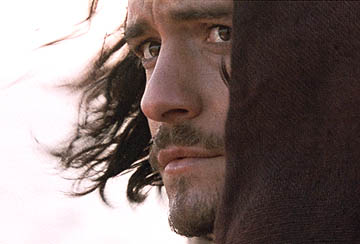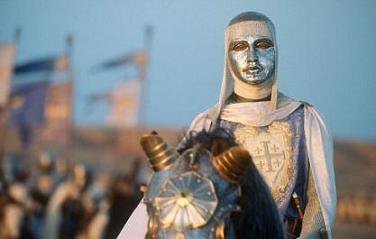 Well, I don’t think being feverish at the time helped by any means — still, Ridley Scott’s Kingdom of Heaven is, well, kinda blah. It’s got its heart in the right place, and I’d say I was mildly diverted by it for the first 75 minutes or so, but after that I was just waiting for it to be over. In terms of recent sword-and-sandal and/or historical siege pics, I’d say it’s better than King Arthur or the woeful Alexander, but probably on a par with Troy or The Alamo.
Well, I don’t think being feverish at the time helped by any means — still, Ridley Scott’s Kingdom of Heaven is, well, kinda blah. It’s got its heart in the right place, and I’d say I was mildly diverted by it for the first 75 minutes or so, but after that I was just waiting for it to be over. In terms of recent sword-and-sandal and/or historical siege pics, I’d say it’s better than King Arthur or the woeful Alexander, but probably on a par with Troy or The Alamo.
Put very bluntly, the gist is this: Legolas (Orlando Bloom) is an ornery, grieving blacksmith somewhere in France who, after a visitation from a world-weary crusader, Lord Qui-Gon (Liam Neeson, playing yet another expository mentor/dead-duck), and his hospitaler, Prof. Lupin (David Thewlis), decides to embark to the Holy Land to seek Christ’s forgiveness for the suicide of his wife. Along the way, he makes a Muslim friend in Dr. Bashir (Alexander Siddig) and a Christian enemy in Celeborn (Marton Csoskas), and discovers that zealots are generally rather unlikable people on both sides of the religious divide. Upon arriving in Jerusalem, Legolas is feted at the court of leper King Tyler Durden (a masked Edward Norton), whereupon he makes more friends (Jeremy Irons, Eva Green) and enemies (Brendan Gleeson, hamming it up like a community-theater Brian Cox), all before an interminably long siege against the forces of Saladin (a charismatic Ghassan Massoud.)
 Are all those fanboy comparisons unfair? Well, not after sitting through the last hour, which basically played like Helms Deep and Minas Tirith all over again. Yes, the production values are immaculate and all the (fetishized) weaponry is used in suitably historic fashion, but, really, how many historic sieges can one be expected to sit through in a given couple of years? Frankly, Kingdom of Heaven was more interesting in the early going, when there was more acting amid the fighting.
Are all those fanboy comparisons unfair? Well, not after sitting through the last hour, which basically played like Helms Deep and Minas Tirith all over again. Yes, the production values are immaculate and all the (fetishized) weaponry is used in suitably historic fashion, but, really, how many historic sieges can one be expected to sit through in a given couple of years? Frankly, Kingdom of Heaven was more interesting in the early going, when there was more acting amid the fighting.
As for the politics, well…the message of the film — religion good, religious zealots bad — is laudable and well-worth hearing these days, perhaps even brave. But, while confessing a near-total ignorance of medieval history, Kingdom of Heaven sure doesn’t seem very historical in its 21st century forward-mindedness. At one point before the siege, Legolas not only makes the case for religious tolerance but completely dismantles the feudal caste system — I was almost waiting for him to institute the ballot box and universal public education while he was at it.
In short, even though I’m in sympathy with the general pluralist worldview of Kingdom of Heaven, the movie could have definitely done with less anachronistic liberal humanism and more dramatic complexity. (In fact, I can’t think of a single character in the film who displayed more than one dimension.) And, even notwithstanding the history, there just needed to be more characterization and less CGI-battling here. As both an historical epic and a summer popcorn film, Kingdom of Heaven felt only a step or two above Purgatory.

